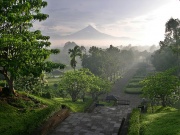Ooroo Abbey, the former temple of the Jedi Order remains the center of Menat Ombo. Amid civil upheaval in 35/36 ABY the Jedi Order ceded the government to civilian authorities. It served as the house of government for the Menat Council until 37 ABY when the planet was conquered during the Fall of New Tython. After the escape of Odan-Urr from the planet, it was demolished by order of the new King.
The Abbey
Construction
 The Avenue leading up to the Abbey steps
The Avenue leading up to the Abbey steps
- "And there upon the hill at the southern end of the city... the Abbey of Ooroo. That's where the Council of Urr convenes to discuss matters of great import that, well, a simple person like me just wouldn't understand"
- ―Menat Ombo resident, on the Ooroo Abbey
The Abbey, Menat Ombo's second largest structure, sits on a hill at the southern end of the city and serves as Menat Ombo's center of government. Built from rock brought in from the Honunom Desert, a feat within itself considering the Desert's extreme temperatures and dangerous fauna, the Abbey was commissioned shortly after the formation of the Council of Urr, taking over a decade to complete due to New Tython's populace being extremely low-tech; simple tools, pulleys, and wooden scaffolds were all that was used by the native and immigrant workers to complete the project.
Interior Description
When one enters the brown-stone walls of the Abbey, they are first greeted with a wide courtyard paved with smoothed stones that lead off to the various "centers" of the Abbey. In the middle of the courtyard is the domed Garden of Meditative Reflection (see below) with the Watchkeeper's guard post just outside the entrance.
Off to the left is one of two locations in the Abbey that is actually guarded; the Meeting Chambers of the Council of Urr. Following the circular layout of the Old Jedi Order's Council Chamber, the Urr Council convenes in a unique room that has a large pit cut into the center, where the Councilors meet. The pit's stone floor is covered with a soft rug that bears the crest of Odan-Urr and each Councilor has a simple cushion to sit on, with the High Councilor presiding from a carved chair. The upper "tier" that rings the pit is open to any who would like to observe the meetings, whether they be Jedi or normal Harakoans. These spectators may choose between standing and sitting on benches that line the circular chamber's walls.
Other areas within the Abbey include the residences of the Urr Councilors, the second guarded area, as well as two private libraries independent of the Jedi Library and private offices where the nitty-gritty work of governmental administration is handled. Finally, there is rumored to be a secret battle circle located somewhere within the Ooroo Abbey, designed to help Menat Ombo's Jedi protectors hone their skills in combat while the daily grind of the city keeps their skills in diplomacy just as sharp.
The Garden of Meditative Reflection
- "Every Jedi should spend time meditating each day on the will of the Force. The reason for this is simple: if one has unwittingly acted contrary to the will of the Force, recognizing the mistake soon after may still give one time to make amends"
- ―Odan-Urr
Just as important as the building itself is the central meditative garden. A true nod to the Old Jedi Order, who preached meditation and consultation before engaging in any sort of conflict, the Garden is a medium-sized grassy, domed enclosure that holds many quiet spots for a Jedi to quietly reflect on his duty to the Force and New Tython. Silence is strictly enforced by the Watchkeeper, a Jedi who serves as the Garden's steward, and the consequence for breaking the silence of the garden is most often an appearance in front of the Council.
In the center of the garden is a small fountain ringed by a circle of flat stones, each stone bearing the name of a founder of House Odan-Urr in Harakoan and Basic script. The garden's only other decoration (apart from the trees, bushes, and shrubbery that are tended to by the Watchkeeper) are four statues carved from the wood found in the forests surrounding the capital, one placed in each corner of the Garden. The statues are carved in the likeness of the four great Jedi of an age long past -- Ooroo, Odan-Urr, Memit Nadil, and Nomi Sunrider (a temporary/informal apprentice of Odan-Urr). On the base of each statue is a piece of wisdom that the Jedi in question imparted to his or her contemporaries and has lasted throughout the centuries to modern day.